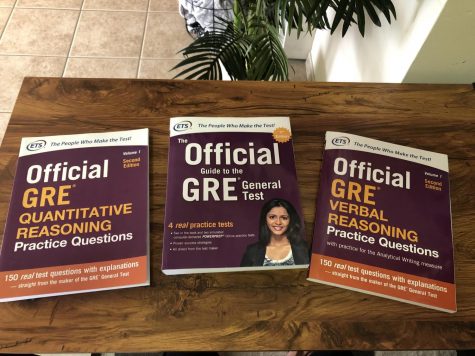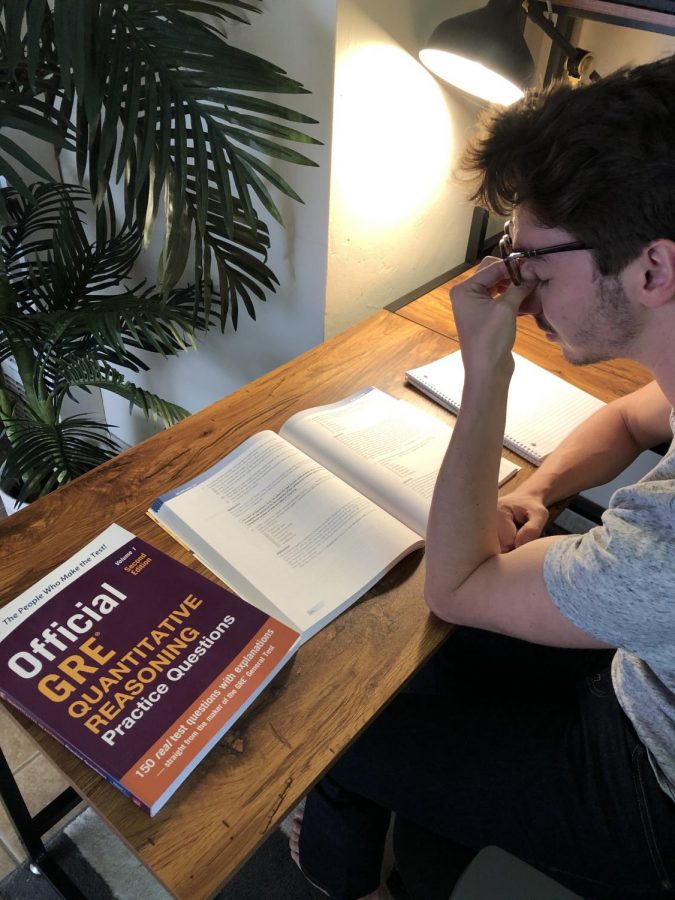For those that don’t know, the Graduate Record Exam, or GRE, is a four-hour, $200 hoop ambitious students looking to further their education after obtaining their bachelor’s degree have to jump through.
For anyone applying to grad school, you are already deeply familiar with this pain, myself included.
This year, some schools have temporarily stopped requiring the GRE, due to COVID-19.
However, more than likely that at least one school you plan to apply to still requires the GRE, and knowing the fundamentals of the exam, as well as preparation strategies, is essential for a great performance.
There are three sections in the GRE: verbal, quantitative (which is math), and analytical writing. The GRE is similar to other standardized tests like the SAT, but if you want to know more about each section check out this link.
I am currently applying to Doctor of Physical Therapy programs, and most require the GRE. Many require a minimum score in the 50th percentile on each section.
After taking the exam and scoring around the 80th percentile, presenting myself as a competitive applicant, I took to Instagram and shared this bit of news. I was flooded with questions from fellow DPT applicants asking for advice from my experience when it came to studying, strategies and what to expect.
My relationship with the GRE started in January. I planned to take the test sometime between April and the end of summer. Applications are due in October, so I wanted plenty of time to retake the test if necessary.
This may seem like a lot of time, but I just wanted to be safe. Many students have said they only took two or three months to properly prepare for the exam. I took the first month to familiarize myself with the format of the exam and buy my test materials.
I used a few different resources to study. I bought the official ETS GRE books which you can find for around $40 on Amazon. This contains one general test guide with two paper practice exams and one book for both the verbal and quantitative sections.
There are a plethora of online GRE prep courses and programs, some of which can be extremely expensive, but PrepScholar GRE is an underrated online program that costs $38 for a full year. I used the program’s diagnostic test to format the course to my needs.

I did up to two lessons a week from January through April, which equated to about an hour a week. This is hardly dedication and I underestimated how much my regular schooling would interfere with studying for the GRE.
By the time April came around, I found I was not ready, so I scheduled my test for early June and studied vigorously. Between April and June, I completed up to six math lessons a week and used PrepScholar GRE’s vocabulary course, which contains about 300 words.

The GRE vocab doesn’t exactly align with everyday vernacular. To study I used sticky notes and placed them around my apartment. Each time I passed a word, I would define it out loud. If I couldn’t define it, I would have to look it up online.
For the writing section, I spent very little time studying. I looked at the ETS list of prompts and took a few minutes to think of how I would respond. I also watched a few helpful videos from YouTuber Greg Mat.
I took my first practice test mid-May and received the passing score I wanted. In the two weeks leading up to the exam, my studying focused on the last three official ETS practice tests. My goal was to build momentum for the actual exam.
These practice tests replicate the testing conditions surprisingly well and offer scores that are accurate to the actual exam. Since each exam took four hours to complete, the next day I would review all of the questions and take detailed notes on what I missed so I could study the material the next day.
My experience studying for the GRE was definitely unique to me, but that’s what set me up for success. When it comes to studying for any standardized test it’s important to do what works for your individual learning style. While there’s no right or wrong way to study, here are 10 tips that helped me.
- Take a diagnostic test or practice test at the beginning to gauge how much you need to improve before test day.
- Avoid expensive study tools. You can use any cheap online program like Magoosh or PrepScholar GRE to familiarize yourself with the basic material. Buy the ETS official GRE texts for your last month of studying.
- Plan for other priorities to get in the way of your GRE studying. The GRE will become your last thing on your to-do list each week and it feels easy to put it off to a later time. Make some commitment to a set time each week.
- Actively study vocabulary words throughout the process. Try to find fun ways to use or study these words.
- Know the math concepts and rules that will be on the test. The quantitative section will try these strategies and use them to trap you into a wrong answer.
- Spend as little time as possible studying for the analytical writing section, unless you know your writing skills are poor. Review some of the prompts and write essays for the practice exams.
- Take the two free practice tests online at ETS as they are exactly like the real exam. There are two paper practice tests in the ETS books. Take the time to review your tests upon completion.
- The GRE is test-adaptive, meaning if you answer most questions correctly in the first verbal/quantitative section, the second one will be much harder. Don’t be deterred if you find that the second half of the exam is harder, it means you are doing well.
- On test day, you can send your score to four schools for free as soon as you finish the exam. Have the GRE code of the schools you are applying to, written on a note that you can quickly pull out. This is your only opportunity to send scores for free.
- Don’t procrastinate taking the exam. If you do not get the score you want, you must wait 21 days to retake the exam. You then have to deal with the time it takes to send the scores to programs you are applying to.
In my research of graduate programs, I have found that aside from getting the minimum score, few programs value the GRE highly. If you meet the benchmark for your program of choice, do not stress out about wanting a higher GRE score.
I want to leave you with this thought that my friend had about the GRE. “These programs want you to take the GRE because they know it’s hard. They want to see that you can work through a four-hour test and overcome its challenges because that’s what a grad program entails.”
Jake Greenfield is a senior studying kinesiology: pre-therapy.







